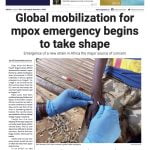After the snap parliamentary elections of February 14, Kosovo has a new government facing the EU’s facilitated dialogue with Serbia for normalization of relations with mutual recognition as the key and only end-goal.
The United States has recognized the independence of the Republic of Kosovo and has a clear position on the dialogue: “A comprehensive normalization agreement with Serbia centered on mutual recognition as essential to Kosovo’s ability to reach its full potential and move forward on its EU accession path.”
The European Union’s position on dialogue is vague, even though EU officials have stressed that normalization talks are fundamental to their goal of both parties becoming bloc members one day. To reach that goal Kosovo has to work with facilitators of dialogue between Kosovo and Serbia, some from countries that have not recognized Kosovo, and with whom Serbia has diplomatic relations.
The EU’s neutral position on the status of Kosovo, with five-member states not recognizing the independence of Kosovo, and no deadline for an agreement to be reached, seems to be supporting the “status quo,” in line with public statements of some of the countries that are meddling in the democratic processes in the region. While the EU has a neutral position on Kosovo, it has a different relationship with Serbia, which is reflected in the pace of the accession process for Serbia compared to Kosovo, which is almost in a deadlock due to the issue of non-recognition.
The Serbian “transactional” approach in the dialogue (partition, ethnic divisions, exchange of people) is not the way forward. On the contrary, it will open a chapter of instability in the Western Balkans. It should not be forgotten that Serbia has committed what many consider crimes against humanity, primarily against the non-Serb citizens in Kosovo. For doing so, NATO waged a war against Belgrade and expelled the Serbs’ military, paramilitary, administration and established an international military and United Nations Interim Administrative presence in Kosovo that was designed to create conditions for the implementation of the democratic will of its citizens as final status, which in coordination with the international community culminated with Kosovo’s declaration of independence on February 17, 2008.
Strangely, the position of five EU members, that they will move to recognize Kosovo only after the agreement between Kosovo and Serbia, creates a dead-end position for the agreement. Waiting for Belgrade’s consent for the independence of Kosovo recognized by over one hundred countries is giving veto power to Serbia for Kosovo’s EU integration and regional stability.
None of the five EU members, the so-called “non-recognizers” (Spain, Cyprus, Romania, Slovakia, and Greece) has any open issue with Kosovo. On the contrary, some of these countries have actively supported Kosovo.
Immediately after the February 2008 declaration of independence, the five EU members cited international law as an explanation for their hesitation and delay on recognition. Those arguments became baseless after The International Court of Justice concluded on July 22, 2010, that Kosovo’s independence declaration had not violated any applicable norm of international law.
The Republic of Kosovo is an independent state within its existing borders, recognized by over a hundred countries and many international institutions. For me, as a signatory of the declaration of the independence of Kosovo, this is an irreversible and non-negotiable political reality.
Therefore, I urge the five non-recognition EU members to recognize Kosovo, especially Greece, which has been very constructive in its cooperation and support, short of recognition. Recognition from all EU countries will boost democratic processes and strengthen regional stability.
There should not be any doubt regarding Kosovo’s constructive position on dialogue. But pressuring the Kosovar government to continue engaging in a dialogue, while the EU holds to its one-sided neutral position, and that recognition from five EU countries depends on Belgrade’s will to achieve, or not, a comprehensive normalization agreement focused on mutual recognition, is a dead end. Kosovo is not going to reverse its independence, nor will it accept changes to its constitutional order.
It’s widely known that Kosovo is committed to living in peace with its neighbors while recognizing and implementing the highest level of human and national rights for all its citizens. The best way to seal sustainable neighborly relations and cement regional peace is for Serbia to accept that the Kosovo-Serbia dialogue should be concluded with a comprehensive, legally binding agreement on normalization and mutual recognition within the existing borders.







